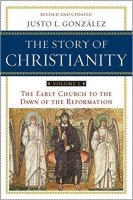 The Story of Christianity, Volume 1: The Early Church To The Dawn Of The Reformation by Justo L. Gonzalez (HarperOne, 2010)
The Story of Christianity, Volume 1: The Early Church To The Dawn Of The Reformation by Justo L. Gonzalez (HarperOne, 2010)
My list of books read this year shows June's tally to be woefully short, a mere two books. In part that shortfall is due to being on vacation with much else calling for my attention, but the primary cause was this 530-page book. I read most of it in June, but it squeaked over into July before completion.
Our rector chose this book for his six-week class in church history. I chose the Kindle version because that enabled me to begin the reading while still out of town—unfortunately we had to miss three of the six classes, and I wanted at least to keep up with the reading. It wasn't easy, because Fr. Trey set a pace that was blistering even to a bookworm like me, though perhaps not to one who has so recently been in seminary and law school.
But I more than kept up. I finished the book yesterday, and the last class isn't until mid-month. What can I say? Once I get started, it's hard to stop. And I have a new birthday book—Brother Cadfael—calling out to me.
Plus, the book is interesting. The earlier chapters are better than the later to my mind, because the closer the author gets to modern times, the more obvious his biases become. I'm wondering if the trend will continue in Volume 2.
Mind you, I don't hold against him the fact that his biases show, even if they are sometimes frustrating. How can someone write on any subject, let alone one as difficult and as sensitive as history, without leaving the imprint of his own life's experiences? Isn't that why particular people write particular books? But the experience illustrates the truth-seeker's variant of caveat emptor: Be leery of trusting single sources.
I'll spare you the collection of quotations this time, but simply share one of my strongest and most lasting impressions.
As most of my readers know, it is my habit to read through the Bible once each year. I like to switch off different versions, and currently I'm using the one called simply, The Message. I don't doubt that many people find this version useful and enlightening, but for me it combines slogging through a swamp with enduring fingernails on a blackboard, so it's taking me a while to make progress. I'm well into my second year, and still in the Old Testament. The constant grind of God sets us on the right path—we mess up badly—God gets mad and threatens to give up on us—bad things happen—God decides he loves us too much to abandon us completely—God sets us back on the right path—we mess up badly—ad infinitum, is getting really old. This theme-and-variations seems a little repetitive in any translation, but it's orders of magnitude worse in The Message.
Enter this book on church history. History in general has been a weakness of mine ever since I learned in school that one could enjoy/be good at science and math or English and history, but not both. (I know. Surely no one actually said that? But that's what I heard.) About the history of the church I know even less, hence my eagerness to take this class. Reading the book made me glad to be experiencing the Old Testament at the same time. Why?
The impression given in most churches seems to me to be that God did a lot of work through history preparing mankind for the Incarnation—the coming of Jesus—and then considered the job done, with nothing left to do till the Second Coming. That's like jumping from the Garden of Eden to the Stable at Bethlehem, without considering all the years of history and preparation in between. What learning something of church history has shown me is how similar the Anno Domini years have been to those Before Christ. It's the same old song in a different key: make a good start, mess up—sometimes disastrously—receive correction, try again, mess up again, etc. Gradually learning, clarifying, and growing in the midst of and in spite of and even because of some really bad stuff going on. Just like Old Testament Israel.
Everything changed with the birth, death, and resurrection of Jesus. And yet ... plus ça change ... people are still people. God's process of teaching, refining, clarifying, and polishing goes on. His work in and on and through his Church is just as important as his work with Israel. It is much like his work with individuals: everything indeed changes radically when one becomes a Christian, but God's work in us is far from complete.
Why do we learn so much in church about what God does in our individual lives, and what he did with Israel BC, but so little about his work with the Church AD?


